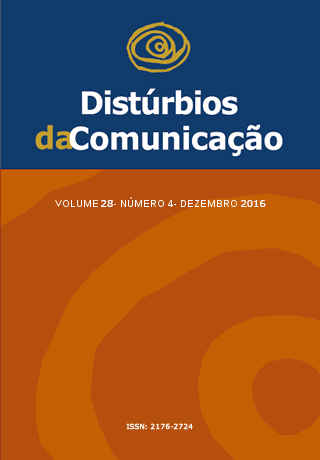Effects of orotracheal intubation in voice and swallowing in adults and seniors
Keywords:
Voice, Swallowing, Intubation, Speech Therapy.Abstract
Objective: describe the vocal alterations and of swallowing in patients submitted to orotracheal intubation and compare them between adults and seniors. Methods: Descriptive observational crosssectional study consiting of 30 patients admitted to the intensive care unit that were intubated from 24 hours to 14 days. The sample consisted of 15 adults, aged between 18 and 59, and 15 seniors patients aged 60 to 79 years. All patients underwent clinical assessment of swallowing and voice, performed about 24 hours after extubation, and analysis of the self- perception of vocal changes. A descriptive analysis by percentage was realized. Results: The mean duration of intubation was higher in the seniors. In the structural evaluation of swallowing the seniors fared worse compared to adults, as well as narrower mouth. The maximum phonation time found in both groups was very low and the perceptual evaluation showed greater impact in the seniors. In the evaluation of vocal self-perception, in both groups, the subjects rated their dysphonia as of higher grade than that given by speech therapists. Conclusion: speech language compromises after extubation were more common in the seniors, characterized by vocal alterations and worse food pathway when compared to adults. The maximum phonation time reduced and the negative vocal self-perception were found regardless of age. Early clinical assessment should be routine because, through it, one can get an early diagnosis of laryngeal disorders, decreasing the rate of systemic complications arising.Downloads
Metrics
Downloads
Published
Issue
Section
License
Copyright (c) 2017 Nathalia Ferreira Campos, Graziela Chamarelli Bougo, Ana Cristina Cortes Gama, Laélia Cristina Caseiro Vicente

This work is licensed under a Creative Commons Attribution 4.0 International License.









